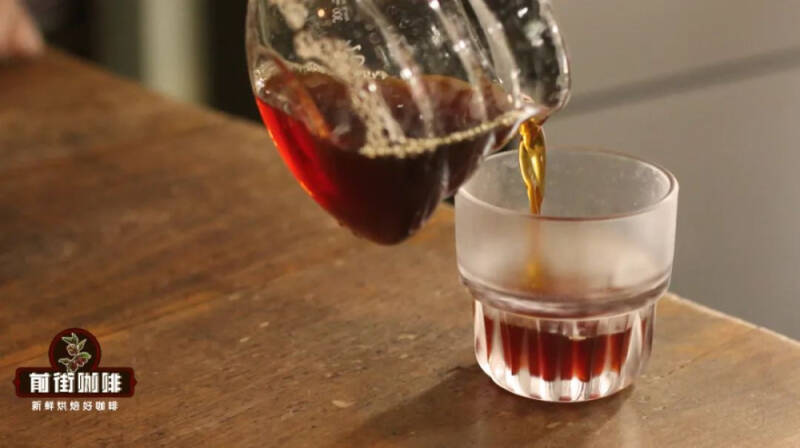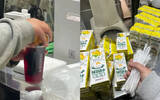The deeper the coffee beans are roasted, the more caffeine will there really be?

Caffeine is the main reason why most people eat coffee! Especially for people who need to stay up late and work overtime, caffeine is the supreme treasure. "DuangDuang" drinks a few cups of coffee just to get the energy of the night brought by caffeine!

Some time ago, Qianjie talked a little bit about the difference in caffeine content between decaf coffee and regular coffee, so a partner asked backstage: I heard that coffee brewed with deep-baked beans will contain more caffeine than coffee made with light-roasted beans. Does the degree of baking really affect caffeine?
Does baking really affect caffeine? For a long time, the Internet has been divided into two factions on the question of whether the degree of baking has an effect on caffeine content. One is that deep-baked beans have more caffeine than light-roasted beans! The point of view comes from the understanding of the quality of coffee beans: the deeper the coffee beans are roasted, the lighter their mass will be. If you use coffee beans of the same weight to brew coffee, deep-roasted beans will require more than light-roasted beans, and in addition, the structure of deep-roasted beans is more fluffy, so it is easier to extract the substances in coffee beans, so these people think that under the same weight, Coffee from deep-baked beans contains more caffeine than shallow-baked beans!
The other group thinks that the caffeine content of deep-roasted beans is less than that of light-baked beans, mainly because the melting point of caffeine is between 235 °C and 238 °C. however, caffeine will sublimate at 178 °C! So they think deep-roasted coffee beans will contain less caffeine! In order to give these two groups a correct answer, the Coffee Science and Information Association (Association for Science and Information on Coffee) conducted such an experiment, using three "cooking methods" for an Arabica coffee bean: a light roast, a medium roast and a deep roast! Measurements were made after baking, and the results were 1.37% (shallow), 1.31% (middle) and 1.31% (deep), respectively. Light-roasted coffee beans are only 0.06% higher than deep-roasted coffee beans, but from this point of view, deep-roasted coffee does have less caffeine than light-roasted coffee.
However, we have not taken into account the weightlessness rate! The weight loss rate of light roasted coffee is 11-13%, and that of deep-roasted coffee is 15-17%. Therefore, although deep-roasted coffee will lose a small amount of caffeine during baking, these losses are almost negligible. Both are true, but both are a little one-sided.
The key factors that really affect the caffeine content, I believe everyone who often looks at the front street can guess the main factors affecting the caffeine content! Yes, it is "bean seed". The genes of coffee beans determine the basis of caffeine content, as we often say: the caffeine content of Arabica is in the range of 0.9-1.4%, while the caffeine content of Robusta is twice that of Arabica, in the 1.8-4% range! Then change the caffeine content of beans according to the planting environment and post-processing!
But not all the caffeine in coffee beans will be extracted. There are about 30% of the substances that can be extracted from coffee beans, including caffeine, and their release will have a key relationship with the extraction efficiency. For example: 15g of Arabica coffee beans are extracted by hand, and 200ml's coffee liquid is obtained by using a powder-to-water ratio of 1:15.
Therefore, we know that the degree of baking of beans has little effect on caffeine! The only factors that can affect the caffeine content of beans are genes, planting environment and post-processing; what can affect the caffeine content in coffee liquid is the efficiency of extraction, not the depth of baking.
-END-
Front Street Cafe
No. 10 Baoqian street, Yandun road, Dongshankou, Yuexiu district, Guangzhou, Guangdong province
Important Notice :
前街咖啡 FrontStreet Coffee has moved to new addredd:
FrontStreet Coffee Address: 315,Donghua East Road,GuangZhou
Tel:020 38364473
- Prev

Is it necessary for the cafe to keep losing $40,000 a month?
▲ Click to follow | Daily boutique Coffee Culture Magazine Coffee Workshop in the new year, the coffee industry is still bidding farewell to the old and welcoming the new, some people have changed careers to bid farewell to leave, but there will always be people decorating ing. In the business of independent coffee shops, people keep coming forward one after another. "Coffee has completely changed my life and become a debtor.
- Next

Manner recruits a large number of "Packers" to arouse dissatisfaction among veteran employees.
▲ Click to follow | Daily boutique Coffee Culture Magazine Coffee Workshop with more than 1,000 stores across the country, I believe many coffee lovers have noticed that their city now has a Manner coffee window, thinking that they can finally bring a cup to fetch wool. On the other hand, there are more stores and more people.
Related
- What grade does Jamaica Blue Mountain No. 1 coffee belong to and how to drink it better? What is the highest grade of Blue Mountain coffee for coffee aristocrats?
- What are the flavor characteristics of the world-famous coffee Blue Mountain No. 1 Golden Mantelin? What are the characteristics of deep-roasted bitter coffee?
- Can I make coffee a second time in an Italian hand-brewed mocha pot? Why can't coffee be brewed several times like tea leaves?
- Hand-brewed coffee flows with a knife and a tornado. How to brew it? What is the proportion of grinding water and water temperature divided into?
- What is the difference between Indonesian Sumatra Mantinin coffee and gold Mantinin? How to distinguish between real and fake golden Mantelin coffee?
- What does bypass mean in coffee? Why can hand-brewed coffee and water make it better?
- Unexpected! Ruixing Telunsu lattes use a smoothie machine to foam milk?!
- % Arabia's first store in Henan opens into the village?! Netizen: Thought it was P's
- Does an authentic standard mocha coffee recipe use chocolate sauce or powder? Mocha Latte/Dirty Coffee/Salty Mocha Coffee Recipe Share!
- What is the difference between Vietnam egg coffee and Norway egg coffee? Hand-brewed single product coffee filter paper filter cloth filter flat solution!

